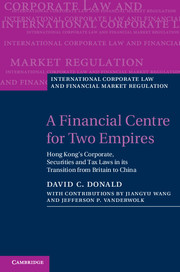 A Financial Centre for Two Empires
A Financial Centre for Two Empires Book contents
- Frontmatter
- Contents
- List of figures
- List of tables
- Preface
- 1 History’s marks on Hong Kong law
- 2 Hong Kong’s economic structure
- 3 Hong Kong corporate and securities laws in response to the Region’s role as China’s international financial centre
- 4 The role of Hong Kong’s tax policies
- 5 Enforcement of corporate and securities law in Hong Kong
- 6 China’s impact on Hong Kong’s position as an international financial centre
- References
- Index
5 - Enforcement of corporate and securities law in Hong Kong
Published online by Cambridge University Press: 05 June 2014
- Frontmatter
- Contents
- List of figures
- List of tables
- Preface
- 1 History’s marks on Hong Kong law
- 2 Hong Kong’s economic structure
- 3 Hong Kong corporate and securities laws in response to the Region’s role as China’s international financial centre
- 4 The role of Hong Kong’s tax policies
- 5 Enforcement of corporate and securities law in Hong Kong
- 6 China’s impact on Hong Kong’s position as an international financial centre
- References
- Index
Summary
Introduction
As discussed in Chapter 3, laws and rules should address real, local problems rather than simply matching generally accepted schema. To this end, Chapter 2 examined the shareholding structures of leading Hong Kong corporate groups and the national composition of the SEHK. However, rules on the books are not enough to guarantee fair and balanced regulation. Powerful and pertinent laws and rules could be enacted or issued by a given jurisdiction, regulatory body or securities exchange to signal quality oversight to the world, yet never be effectively enforced. Enforcement could also be selective or biased in such a way that the announced ends of the regulatory framework are not supported or are even thwarted. In such case, regulation for fairness and efficiency would be signalled but never realized. This is a particularly undesirable situation because casual observers would receive unfounded reassurance of regulatory soundness. To understand the quality of regulation in a given jurisdiction one must therefore also evaluate how it is actually applied rather than simply catalogue the provisions. That is the purpose of this chapter.
- Type
- Chapter
- Information
- A Financial Centre for Two EmpiresHong Kong's Corporate, Securities and Tax Laws in its Transition from Britain to China, pp. 188 - 222Publisher: Cambridge University PressPrint publication year: 2014
- 1
- Cited by
